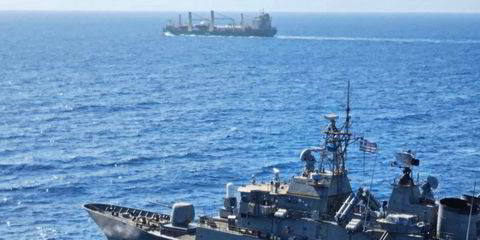Four of Vale's fleet of 404,000-dwt ore carriers will be employed under the contract, which was signed today in the Shandong province coastal city of Qingdao.
Details were not immediately available on how the contract could be squared with a Chinese nationwide ban of the Valemax fleet, which has been in effect for almost two years and violated only once.
Chinese domestic reports did not mention the length of the contract, described as one of the world's biggest shipping contracts of recent years and the biggest ever for relative newcomer Shandong Shipping.
They describe it as a "comprehensive strategic transport agreement" encompassing ocean transport, shipmanagement, finance and asset management.
China's largest non-state owned bank, Minsheng Bank, is said to be providing financial services, representing a number of financial companies that are involved in the deal.
Shandong Shipping, backed by provincial interests, has made headlines with a number of large-scale deals including a 10-year contract of affreightment (COA) with Australian miner BHP Billiton, for which Shandong is building a series of 250,000-dwt VLOCs at Bohai Shipbuilding Heavy Industry for delivery in 2015 - some say as many as six such ships.
The new deal represents a breakthrough in a two-year international standoff, one that could be a setback for the capesize market and for Chinese state-owned shipowner Cosco.
The controversial Valemax fleet, which will number 35 ships owned by Vale and its shipowning partners if delayed final units are delivered, was originally meant to enable Vale to control its transport costs and make its ore cost-competitive with that of Australia's mining companies, who have only a fourth as much distance to cover to their main customers in China.
But the fleet has been the object of a long struggle with protectionist interests in China. China's state-owned Cosco Group and the Chinese Shipowners' Association (CSOA), of which Cosco is a member, have won central government backing for a ban of the fleet from Chinese ports.
Safety issues are adduced as grounds for a ban by China's Ministry of Transport, but Cosco and the CSOA have made it clear that they believe Vale's ships are unfair competition for Chinese-owned capesizes.
Vale and its partners have won the support of some steelmakers and not least of local officials in Chinese port cities such as Qingdao and Lianyungang, where port volumes are regarded as an important ingredient of local economic development.
In April, local authorities at Lianyungang defied the nationwide Valemax ban by allowing the 404,000-dwt Vale Malaysia (built 2011) to make a stealth call with a lightened 224,848-tonne cargo and an artificially reduced load-line certificate.
That has been the only Valemax call in China since January 2012, and the Brazilian company has instead worked to develop a network of peripheral transhipment and distribution facilities, both afloat in Subic Bay in the Philippines and on dry land at Teluk Rubiah in northern Malaysia.
Officials of China Cosco Bulk in Beijing were not aware of the Shandong-Vale contract announcement when contacted by TradeWinds.




